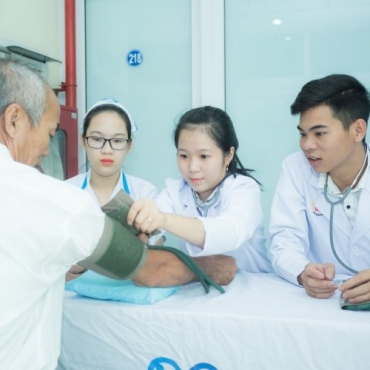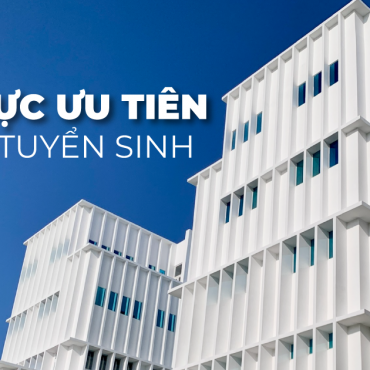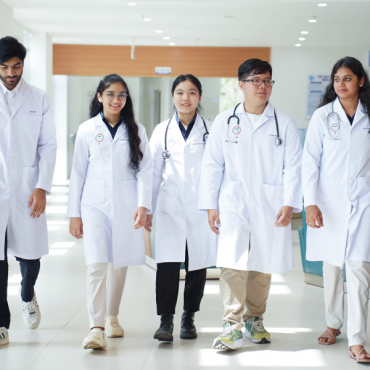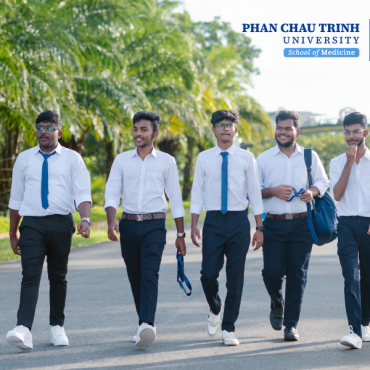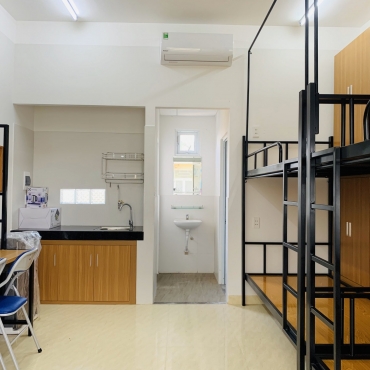Contact Admission
International Collaboration
Over a decade of pursuing the dream of wearing the white coat — the journey of a young man from Quang Nam
After graduating with a degree in Pharmacy, Nguyễn Thanh Hà (born in 1996, from Đại Lộc commune, Đà Nẵng City) decided to pursue a second degree in General Medicine at Phan Chau Trinh University (PCTU). Her decision to switch to the field of Medicine marked the beginning of a journey to deeply explore the human body and the essence of healing.
Over a decade of dedication to the healthcare field
Nguyễn Thanh Hà graduated with a degree in General Medicine from Phan Chau Trinh University (PCTU) in early July. To don the white coat and become a doctor, Hà went through 11 challenging years—starting in Pharmacy before making a life-changing decision to shift into Medicine. For Hà, this path has not only been about pursuing a personal passion but also about continuing an unfinished dream of his father, who once aspired to be a doctor but had to put that dream aside due to war.
In high school, Hà dreamed of studying Medicine, but eventually chose to pursue Pharmacy at a university in Ho Chi Minh City. During the five years studying Pharmacy, he gradually realized that his true passion wasn’t just in chemical formulas or pills, but in the root of healing—clinical medicine. “Studying Pharmacy felt like understanding the surface of the problem. But to truly know why someone needs a pill, only Medicine can provide that answer,” Hà shared.
After graduating in 2019, Hà came across an admissions notice for the General Medicine program at PCTU—a university he had once stumbled upon during a visit to Đà Nẵng, when he and his father ended up at the school gate simply because… they had run out of gas.
“Right after graduating, I called my dad and asked, ‘Dad, I want to study Medicine. Will you let me?’ He said yes—because that had once been his childhood dream,” Hà recalled. And so, just a few months after finishing his Pharmacy degree, Hà’s journey into Medicine began.
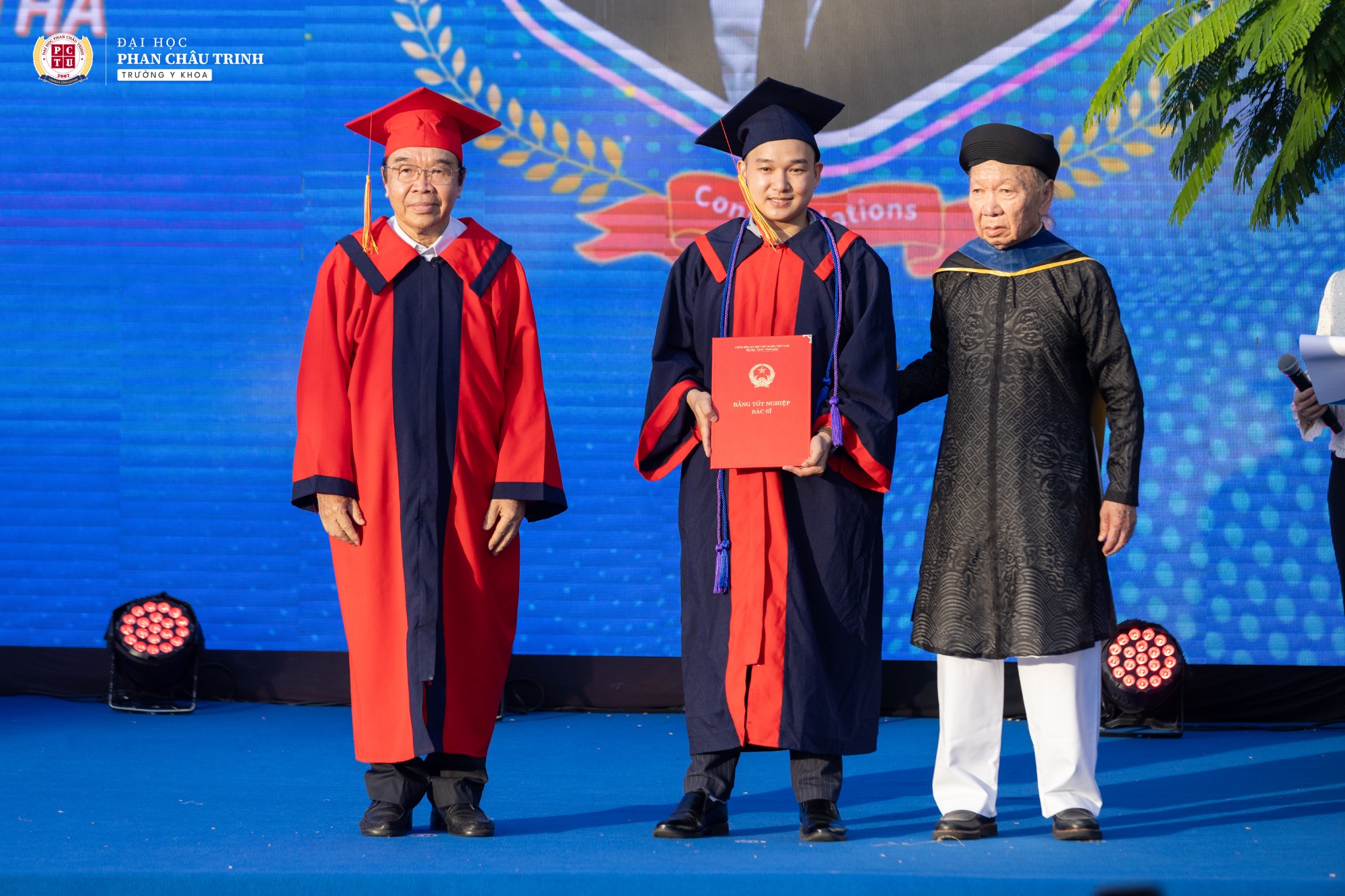
Dr. Nguyễn Thanh Hà at the 2025 Graduation Ceremony of PCTU
Two Foundations – One Path
For Hà, the years spent studying at PCTU were filled with unforgettable memories. The university gave him the opportunity to intern and experience the hospital environment from his very first year—allowing him to understand the role of a doctor, to feel the pain of patients, and to witness the joy of saving lives.
“My first clinical rotation was a nursing module at Ngu Hanh Son Hospital in Da Nang. The nurses there were incredibly kind—they guided us patiently, let us draw blood, insert IVs, and try so many things. The patients were also very supportive—some even offered us food or gave us their addresses and invited us to visit their homes,” Hà recalled fondly.
Among those memories, Hà vividly remembers the first time he witnessed the moment between life and death. While interning in the Internal Medicine department, he saw a patient pass away despite the doctors’ best efforts. “I was in shock. But it was also the moment I realized that this profession requires more than just medical knowledge—it demands emotional strength,” he shared.
The night shifts continued over the course of six years. Hà often joined doctors and medical staff in pushing stretchers through hospital corridors in the dark. One person pushed the stretcher, another manually ventilated the patient with an ambu bag, another performed CPR—fighting to bring patients back from the brink. Some cases were stable in the morning but worsened suddenly by evening, requiring emergency ICU care. These moments taught Hà what it means to be a critical care doctor on 24/7 alert—the chill that comes when a monitor alarms for cardiac arrest, and the overwhelming joy when a patient shows signs of life again.
In contrast to the intensity of emergency care, Hà was deeply moved when recalling his first experience assisting a childbirth. “The baby was pink and healthy. Everything I’d learned in school suddenly came to life. Witnessing that moment was indescribable,” he said. “Dr. Phan Gia Anh Bảo, a lecturer at PCTU and also the attending physician, guided me through every procedure. Thanks to him, I understood each step and learned to stay calm and take control.”

Nguyễn Thanh Hà during his internship at Tam Tri General Hospital, Nha Trang
Having previously studied Pharmacy gave Hà a unique perspective on both disease and treatment. Medicine helped him understand the root causes of illnesses, while Pharmacy taught him how drugs are absorbed, how they affect the human body, and what side effects they may cause. This dual knowledge enables him to provide better prevention strategies and thorough counseling for patients.
For Hà, after more than a decade of studying and practicing in hospital settings, the most valuable lesson he has learned goes beyond medical knowledge—it is about maintaining the right attitude toward the profession. He still remembers the words of Professor Dr. Bùi Duy Tâm:
“When practicing medicine, don’t think about money first. Just give it your all, and money will come. If you truly care and give your best, people will compensate you fairly. And even if they don’t, you will still gain their respect, their trust, and the joy of saving lives.”
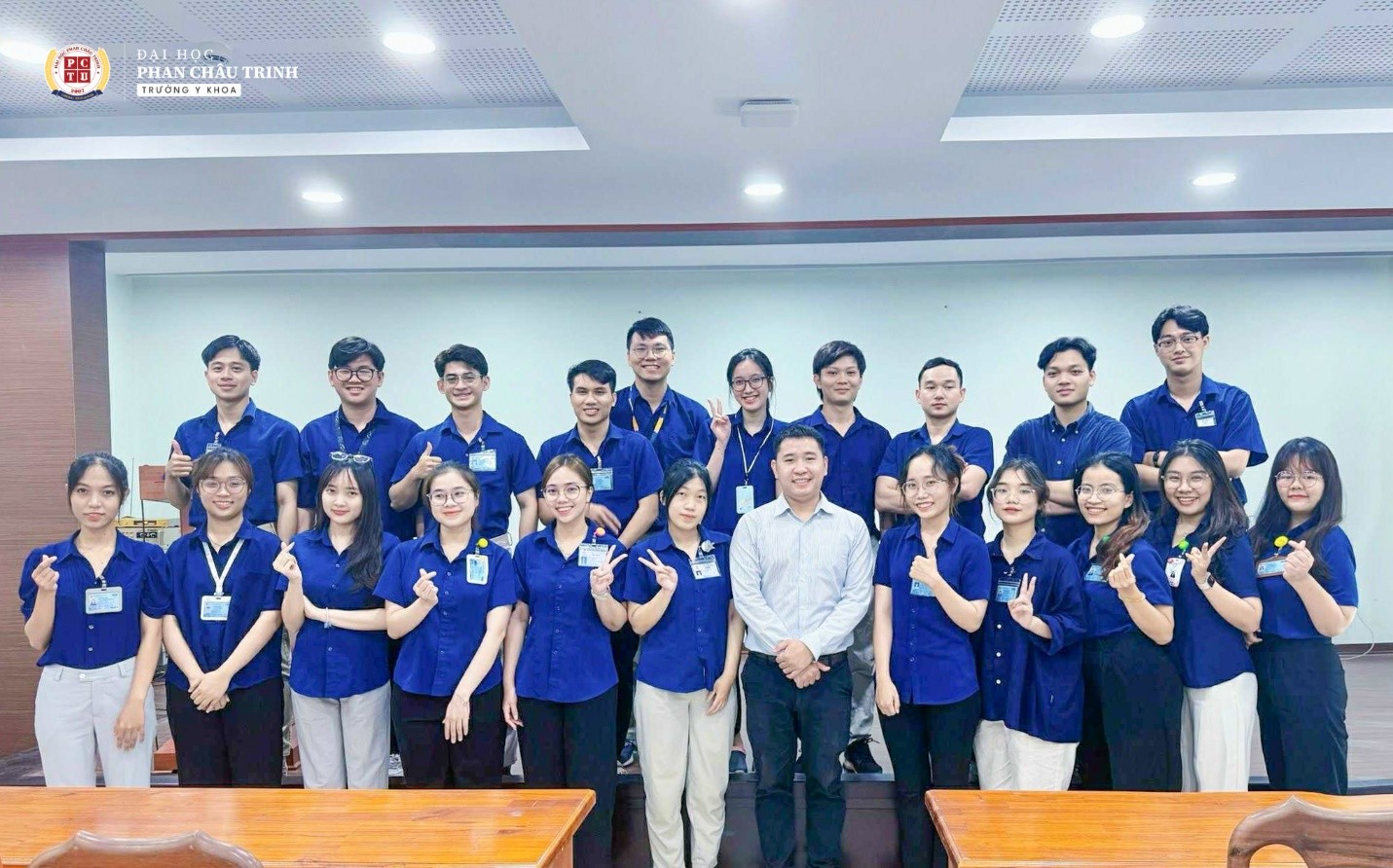
Nguyễn Thanh Hà (third from the right, back row) during his internship at Da Nang CDC
According to MSc. Dr. Lê Thị Minh Tâm, academic advisor of class 19YK1, Nguyễn Thanh Hà is a diligent and inquisitive student. Hà spent his summer breaks and holidays taking on extra clinical internships at various hospitals. “Hà has a strong foundation in English and holds two university degrees—one in Pharmacy and one in General Medicine—giving him solid expertise in basic medical sciences. The university has even invited him to serve as a teaching assistant for the international medical student cohort,” Dr. Tâm shared.
Regarding his future plans, Hà said he has registered for an internship at Tam Tri General Hospital in Da Nang to earn his medical practice license, and he hopes to return to work within the Phan Chau Trinh University’s Institute–University system.
When asked for advice for current and future medical students, Hà emphasized the importance of maintaining confidence and integrity in the profession—without arrogance. “When you walk into a patient’s room, be ready to talk, to listen, and to connect. Patients trust you, they give you opportunities to learn—letting you draw blood, place IV lines. Many are willing to help medical students because they believe these students will one day become doctors who may save them or others. That trust is a form of recognition,” Hà said.
For furthur information:
- Programs
- Tuition and Fees
- How to Apply
- Facilities
- Activities & Experiences
- Student Life
- Follow us on Facebook
Contact us:
Admission Office:
- Mr. Nguyen Van Minh - Admission Office – Phan Chau Trinh University
- Address: 09 Nguyen Gia Thieu street, Dien Ban Dong ward - Da Nang city
- Tel: (+84235) 3 757 959 or +84.0981.559.255
- WhatsApp Number: +84.0981.559.255 or +84.0962.553.155
- Email: tuyensinh@pctu.edu.vn
- Fanpage: www.facebook.com/daihocphanchautrinh
Other admissions
- Kicking off the new year by continuing to welcome international students for clinical placements. ( 11:17 - 24/02/2026 )
- Promoting Training and Research Collaboration with Bond University ( 21:02 - 14/02/2026 )
- A Healthcare Turning Point in Central Vietnam: The Tissue Bank of The Phan Chau Trinh Medical University - Hospital ( 20:06 - 14/02/2026 )
- Continuing to welcome more international students in February ( 13:25 - 04/02/2026 )
- Another Korean University sends students for clinical training ( 13:28 - 29/01/2026 )
- Premier Clinic – Where International Healthcare Standards Go Hand in Hand with Modern Medical Education ( 16:03 - 15/01/2026 )
- 50 Korean students complete the Cadaver Dissection Practice course ( 18:40 - 08/01/2026 )
- Looking Back at 2025 – A Journey of Milestones and Breakthroughs ( 14:35 - 31/12/2025 )
- The Journey That Stirred a New Heartbeat ( 16:35 - 11/12/2025 )
- One-on-one Clinical Training Journey in the United States for PCTU Medical Students ( 15:02 - 04/12/2025 )






